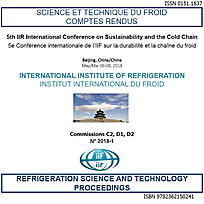
IIR document
Energy agreements regarding grocery stores for a sustainable society - Lessons learned.
Number: pap. 21
Author(s) : LINDBERG U., ROLFSMAN L., SWARTZ H.
Summary
In this study we aim to shed light on waste heat from commercial refrigeration, which is common but unnecessary. Excess heat is the heat which is not recovered, although it is possible to do so. We include heating for existing buildings:grocery stores as stand-alone, or within another building. VariousSwedish perspectives of the parties involved, tenant and landlord, are discussed. Theoretically and technically, it is not difficult to distributeexcess energy from a tenant to another receiver, which in turn uses the energy. However, to meet energy goals regarding energy consumption for heating buildings requires new and efficient approaches. The technique is already known and availableon the market. We suggest that availableenergy and heat recovery projects, contracts and agreements maysignificantly enhance the possibility of creating viable energy efficiency projects, and include excess heat. Results include lessons learned from the parties.
Available documents
Format PDF
Pages: 8
Available
Public price
20 €
Member price*
Free
* Best rate depending on membership category (see the detailed benefits of individual and corporate memberships).
Details
- Original title: Energy agreements regarding grocery stores for a sustainable society - Lessons learned.
- Record ID : 30023363
- Languages: English
- Source: 5th IIR International Conference on Sustainability and the Cold Chain. Proceedings: Beijing, Chine, 6-8 avril 2018
- Publication date: 2018/04/06
- DOI: http://dx.doi.org/10.18462/iir.iccc.2018.0021
Links
See other articles from the proceedings (72)
See the conference proceedings
Indexing
-
Energy distribution concepts for Urban Supermar...
- Author(s) : SELVNES H., HAFNER A.
- Date : 2018/06/18
- Languages : English
- Source: 13th IIR Gustav Lorentzen Conference on Natural Refrigerants (GL2018). Proceedings. Valencia, Spain, June 18-20th 2018.
- Formats : PDF
View record
-
Optimising a supermarket refrigeration system w...
- Author(s) : STEUER D., JOSEFSSON F., ARIAS J., SAWALHA S.
- Date : 2023/08/21
- Languages : English
- Source: Proceedings of the 26th IIR International Congress of Refrigeration: Paris , France, August 21-25, 2023.
- Formats : PDF
View record
-
Techno-economic analysis of heat export from su...
- Author(s) : STEUER D., ALMEBÄCK J., MAGNIUS R., SAWALHA S.
- Date : 2023/08/21
- Languages : English
- Source: Proceedings of the 26th IIR International Congress of Refrigeration: Paris , France, August 21-25, 2023.
- Formats : PDF
View record
-
Energy management system utilizing exhaust heat...
- Author(s) : WATANABE T., SHIKANO T., BAE S., et al.
- Date : 2015/08/16
- Languages : English
- Source: Proceedings of the 24th IIR International Congress of Refrigeration: Yokohama, Japan, August 16-22, 2015.
- Formats : PDF
View record
-
Cooperation for heat recovery from a supermarke...
- Author(s) : STEUER D., ANDERSSON E., JOSEFSSON F., SAWALHA S., ARIAS J.
- Date : 2022/06/13
- Languages : English
- Source: 15th IIR-Gustav Lorentzen Conference on Natural Refrigerants (GL2022). Proceedings. Trondheim, Norway, June 13-15th 2022.
- Formats : PDF
View record
